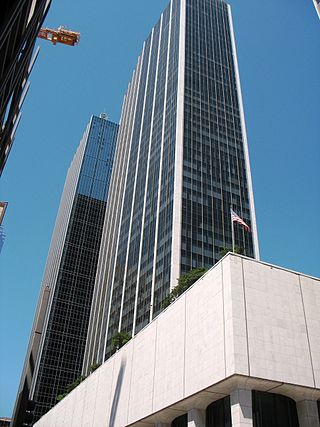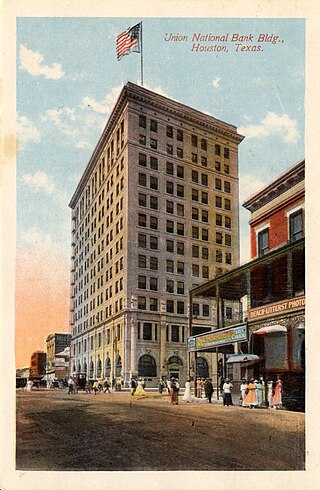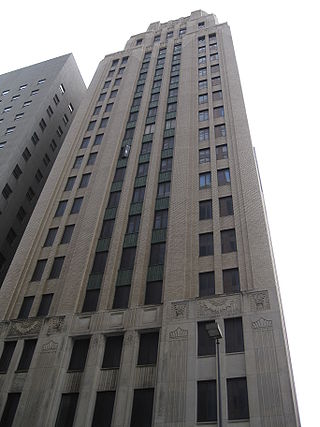Marriott Hotels & Resorts is Marriott International's brand of full-service hotels and resorts based in Bethesda, Maryland. As of June 30, 2020, there were 582 hotels and resorts with 205,053 rooms operating under the brand, in addition to 160 hotels with 47,765 rooms planned for development.

The JPMorgan Chase Building, formerly the Gulf Building, is a 37-story 130 m (430 ft) Art Deco skyscraper in downtown Houston, Texas. Completed in 1929, it remained the tallest building in Houston until 1963, when the Exxon Building surpassed it in height. The building is the Houston headquarters of JPMorgan Chase Bank, and was formerly the headquarters of Texas Commerce Bank.

The architecture of Houston includes a wide variety of award-winning and historic examples located in various areas of the city of Houston, Texas. From early in its history to current times, the city inspired innovative and challenging building design and construction, as it quickly grew into an internationally recognized commercial and industrial hub of Texas and the United States.

The National is a 52-story, 191 m (627 ft) skyscraper in the Main Street district of downtown Dallas, Texas, adjacent to the Dallas Area Rapid Transit (DART) Akard Station. It is the tenth tallest building in the city. In January 2010 the building was closed due to low occupancy rates. It was listed on the National Register of Historic Places in 2017.

Hotel ICON is a boutique hotel located in downtown Houston, Texas, USA. The building was originally built for the Union National Bank.

The Club Quarters Hotel is a 16-story, 61.6 m (202 ft) Beaux-Arts high-rise at 710 Fannin Street in downtown Houston, Texas, United States. The building is listed on the National Register of Historic Places as the Texas State Hotel.

The Alaska Building, which now houses the Courtyard by Marriott Seattle Downtown/Pioneer Square, is a 15-floor building in Seattle, Washington completed in 1904 to designs by St. Louis architects Eames and Young. At the time of its completion, it was the tallest building in the state of Washington—and remained so until the 1910 completion of Spokane's Old National Bank Building.

The Renaissance Cincinnati Downtown Hotel is a historic building in downtown Cincinnati, Ohio, located at 4th & Walnut Street. The 19-story tower was the tallest building in the state for 3 years until completion of the Fourth & Walnut Center.

The Barnes and Thornburg Building is a high rise in Indianapolis, Indiana originally known as the Merchants National Bank Building. In 1905, the Merchants National Bank and Trust Company engaged the architectural firm of D. H. Burnham & Company of Chicago to design a new bank headquarters on the southeastern corner of the Washington and Meridian streets, the most important intersection in Indianapolis. Initial occupancy of the lower floors took place in 1908, while the upper floors were not completed until 1912.

The First National Bank Building is a historic building in downtown Albuquerque, New Mexico, and the former headquarters of the First National Bank of Albuquerque. The nine-story building was completed in 1923 and was considered the city's first skyscraper with an overall height of 141 feet (43 m). It remained the tallest building in the city until 1954, when it was surpassed by the Simms Building.

John Lawrence Mauran, FAIA (1866–1933) was an American architect responsible for many downtown landmarks in St. Louis, Missouri. He was also active in Wisconsin and Texas.

Alfred Charles Finn was an American architect. He started in the profession with no formal training in 1904 as an apprentice for Sanguinet & Staats. He worked in their offices in Dallas, Fort Worth, and Houston. His credits during his tenure residential structures, but firm was a leader in steel-frame construction of skyscrapers.

The Blackstone Hotel is the tallest hotel in downtown Fort Worth, Texas, at 268 ft (82 m) tall. Located on the corner of Fifth and Main Streets, it is noted for its Art Deco design with terracotta ornamentation and setbacks on the top floors. The hotel was constructed in 1929 and operated for over 50 years before it sat vacant for nearly 20 years. The Blackstone Hotel guest list is full of notable people including Presidents of the United States: Harry S. Truman, Dwight D. Eisenhower, John F. Kennedy, Lyndon B. Johnson, and Richard M. Nixon. The hotel was also host for a few movie stars such as Bob Hope, Clark Gable, and Elvis Presley. It was added to the National Register of Historic Places on February 2, 1984. The building was restored in the late 1990s and is still in use today as the Courtyard Fort Worth Downtown/Blackstone, although it is still known as the "Blackstone Hotel" to those who live in or have ties to Fort Worth.

The Tower Petroleum Building is a historic Art Deco Skyscraper located at 1907 Elm Street in the City Center District of Downtown Dallas. The tower, a contributing property in the Dallas Downtown Historic District and the Harwood Street Historic District, features Zig-zag Moderne styling and was designed by architect Mark Lemmon.

The JW Marriott Downtown Houston is a hotel located at 806 Main Street in Downtown Houston, which opened in 2014. It had been previously known as the Carter Building, and was the tallest building in Texas when it opened in 1910. The building was renamed Second National Bank Building in 1923.

The Great Southwest Building, formerly the Petroleum Building and the Great Southwest Life Building, is a historic commercial skyscraper located at 1314 Texas Avenue in Downtown Houston, Texas, United States. Originally built in 1927 as an office space for The Texas Company, the building is now the site of the Cambria Hotel Houston Downtown Convention Center. It was listed on the National Register of Historic Places on August 8, 2019, for its historical and architectural significance.
Courtlandt Place, Houston is a residential subdivision consisting of a single street, south of downtown Houston, planned in 1906. Courtlandt Place is a member of the Neartown Houston Association.

The Stowers Building is located at 820 Fannin Street in downtown Houston. The building was constructed in 1913 and is listed on the National Register of Historic Places (NRHP). The building is named for George Arthur Stowers and his furniture company, which had moved into the new "skyscraper" after a fire at his Main Street store. The local firm of Green & Finger designed the ten-story building which was constructed out of reinforced steel by Pearson & Co. The building was representative of a period of skyscraper construction in Houston between 1908 and 1913. It is listed on the National Register of Historic Places.

People's National Bank Building is a high-rise building in Courthouse Square, Tyler, Texas, at 102 N. College Street. It is listed on the National Register of Historic Places. The Art Deco building was designed by noted Texas architect Alfred C. Finn, who touted an extensive portfolio of steel-framed skyscrapers when the People's National Bank Building was completed in 1932. Since 2014 it has been known as the People's Petroleum Building.




















